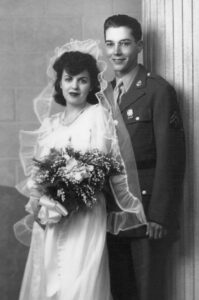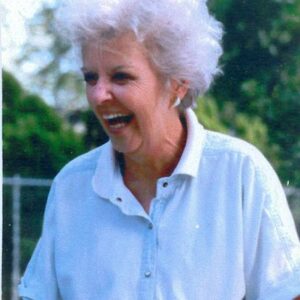After seeing a terrific one-woman show on Friday night (Charlotte Booker’s original show about Elsie Lanchester), Jan and I came home and she showed me THAT episode of The Bear. (We watched season one this summer, and I’ve been slowly catching up since we got home). Season 2, Episode 5, “Fishes,” is rightly lauded and praised – for acting, for writing, for directing, for storytelling, everything. Jan was excited for me to see it, because she found it so amazing.
I too found it amazing, but for a different reason. Watching it, I was transported back to 3313 Hunter Street in Royal Oak, Michigan, every Sunday of my childhood. The post-war starter home wasn’t quite so loud, and wasn’t nearly so busy. But the undercurrent of threat radiating from the matriarch – my grandmother – was EXACTLY the same. Oh, Lyla used humor more than Jamie Lee’s character, her sharp tongue whittling down everyone and everything. My grandfather had retreated into silence, focused on the television, until he would suddenly erupt into rage over some seemingly inconsequential thing (“Where’s the ketchup!?!”).
Other characters were painfully recognizable. My mother played the role of Sugar, always trying to make things better while being belittled by Lyla. My aunt Cheryl was Michael, loving and funny and sympathetic until she had a few drinks (or some coke on her gums) and then stirring shit and turning nasty. My uncle David (for whom I am NOT named) was both reviled and protected by Lyla and Chuck. They ruined him by protecting him from all consequences, from getting his teenage girlfriend pregnant to embezzling from his work. (Theatre enthusiasts may laugh when I state that he is the only person I have known in life who had a Bunbury of his own, just like Algernon’s fictional excuse to escape the world in The Importance Of Being Earnest. Only my uncle would use his “imaginary invalid” Tom to cheat on his wife and father a string of illegitimate children).
Dinners at 3313 were electric, and awful. We didn’t have outright violence – no throwing of forks that I recall. But damn, the tension vibrated through those walls. Emotional violence was committed with every bite. With the temperature cranked up, the large picture window behind my grandfather’s chair wept condensation throughout the meal. I always said that after Lyla and Chuck died, we shouldn’t have sold the house, but rather razed it and salted the earth.
 By the time I was in the picture, Chuck was mostly a nonentity. He was just retiring from GM, and he enjoyed puttering in the basement. He built a beautiful doll house for me, which I found odd, but appreciated as a show of affection. He could never say, “I love you.” The closest he could come was, “Drive safe.” But the stories from my mother’s childhood give me a better sense of the man, who raged and shouted at his wife, threatening to leave, even going so far as packing the car. My mother remembers huddling on the stairs holding her two little siblings while her parents raged at each other. Chuck didn’t want my mother to have shoes, because she was a girl, so why should she ever need to leave the house? When she got her degree from the University of Michigan – making her the first college grad in the family – they made fun of her, saying she had flunked out of Michigan State, rather than having transferred.
By the time I was in the picture, Chuck was mostly a nonentity. He was just retiring from GM, and he enjoyed puttering in the basement. He built a beautiful doll house for me, which I found odd, but appreciated as a show of affection. He could never say, “I love you.” The closest he could come was, “Drive safe.” But the stories from my mother’s childhood give me a better sense of the man, who raged and shouted at his wife, threatening to leave, even going so far as packing the car. My mother remembers huddling on the stairs holding her two little siblings while her parents raged at each other. Chuck didn’t want my mother to have shoes, because she was a girl, so why should she ever need to leave the house? When she got her degree from the University of Michigan – making her the first college grad in the family – they made fun of her, saying she had flunked out of Michigan State, rather than having transferred.
But then, making fun of their daughter was common for them. My mom tells a story about dining at a friend’s house and coming home to describe to Lyla how nice it had been, with flowers and candles on the table. Lyla responded the next night by putting out a bowl of dead flowers and placing broken candles on the table. Lyla thought it was hilarious.
My mother was usually the one cooking dinner during her childhood. Lyla would take “mommy’s little helper” and space out through the afternoons. It was up to my mother to clean and start making dinner, all while remaining absolutely silent – if she woke Lyla from her “nap” there would be hell to pay.
Of course, Lyla had her own tragic backstory. One of ten children, she was her father’s golden child, which made her mother jealous. Lyla could play the piano by ear. Anything she heard, she could recreate. Her father loved trotting out little child Lyla to entertain his friends by performing popular songs while they played cards and entertained. Her siblings resented her privileges, and she resented them right back. She had a disabled older sister, Dorothy, and their parents forced Lyla to repeat a grade in elementary school so she didn’t pass her sister.
Like any natural talent taken for granted, amazing musical skills didn’t interest Lyla. She loved drawing. At the end of high school, Lyla was given a scholarship to an art school in Detroit. She was thrilled. After two weeks there, her mother came to pick her up for lunch, and was shocked – shocked! – by the nude statues on campus. She forced Lyla to drop out. Seeing no alternative, Lyla accepted a marriage proposal from Chuck, and spent the rest of her life turning all her artistic talent into venom and caustic humor. A chainsmoking dry alcoholic, she was alternately racist, sexist, homophobic, ableist, and more. She and Chuck were the people who didn’t understand that All In The Family was satire. They thought Archie Bunker was a hero, because he was just like them.
Oddly enough, I was spared the lash of Lyla’s tongue. Like Hitler, Lyla loved dogs and little children. Possibly because I was the first grandchild, but more likely because she enjoyed showering affection on me in front of the son she had neglected and abused, Lyla made me her accomplice. I was her audience for the insults she ladled out as she made her delicious noodles from scratch, or amazing chocolate cake, or her limp, boiled broccoli, or her overcooked meat so dry it fell apart in strands. I shudder to think how I laughed as she ridiculed her husband and children to me. She often told me my parents didn’t love me, only she did, and I should come live with her. She had already successfully made this play when my mother went to college, telling my then-8-year-old uncle that my mother had left because she didn’t love my uncle anymore. Fortunately, I was secure enough in my parents’ love that this didn’t work on me. She retaliated by ruining Santa Claus.
I could go on and on with stories of gaslighting, passive-aggressive comments and actions. I’ve often entertained people with the story of Lyla heckling Chuck’s eulogy (this happened!). But the clearest example of who she was, peak Lyla, was when my Aunt Cheryl died. At the age of 40, my aunt had a heart attack while shopping during her lunch break on Michigan Avenue in Chicago. My mother was notified, and they drove in to break the news to Lyla and Chuck. Upon hearing of Cheryl’s death, Chuck was silent while Lyla looked at my mother, her own daughter, and said, “I’ve lost the only child I’ve ever loved.”
I’ve always thought they would make a good play, Lyla and Chuck. But I just don’t want to spend so much time in their heads. So I’m grateful to The Bear for doing it for me. Just as I can appreciate August, Osage County, Who’s Afraid Of Virginia Woolf, and A Long Day’s Journey Into Night. The family dinner is a perfect setting for drama. Good art is evocative of lived experience. It can be hard to revisit, but also cathartic. After watching the episode, it was great sharing with my wife, who thankfully owns no frame of real-life experience for that episode, the tales of weekly drama that were dinners at 3313. Just like Carm reclaiming cannoli from those terrible memories, sharing these tales makes good art.
Because the best art comes from truth.



This was painful to read. I can’t quite imagine living it. I’m sorry you had to
You are very kind. I emerged relatively unscathed. But she absolutely traumatized her children, which led to disastrous results for my cousins. My mother made the conscious decision to be the opposite of her mother, which led to a very loving household for my childhood.